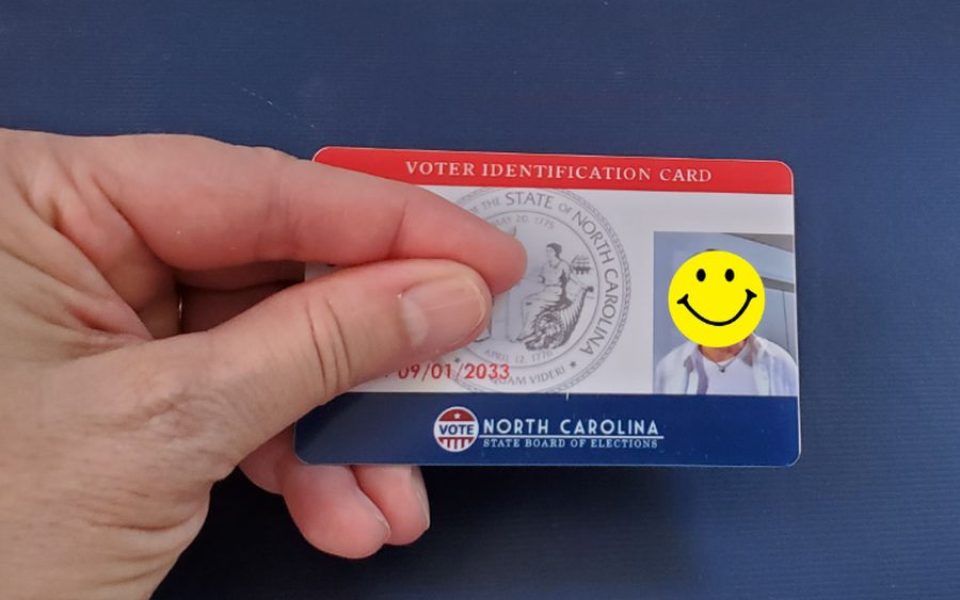
I’m driving up in the mountains trying to find my friend’s house. The signal on my phone doesn’t reach into these hollers and the instructions I have are less directions than simply a list of landmarks: Left up past the abandoned gas station, down past a sheep farm, look for the stand of maple trees.
I find the house eventually, but the sheep farm and maple trees all seem par for the course. This address was really hard to find. I don’t remember seeing a mailbox, but maybe one was there.
This is just one of the many things I thought of when the North Carolina General Assembly passed SB 747 into law. I also thought about the woman who briefly lived in a tent behind my house as she looked for housing or my neighbor who fled partner abuse and floated from house to house for months.
Under SB 747, same-day registrants voting during the early voting period are required to prove their identity and their address when they register. Despite this proof of who they are and where they live, they are still required to vote on a “retrievable” ballot that will be thrown out if a single piece of mail sent to them after they vote by their county board of elections is returned as undeliverable. Their voter registration will be thrown out, too.
Those might sound like boring details — the stuff made up by level-headed administrative types — but the impact is very real. The fear is that the disenfranchisement SB 747 subjects certain North Carolinians to is by design. I have lived with and worked with poor and working-class people my entire life and we are the type of people who get caught in “details” like that. Having a steady address is increasingly a luxury in a housing market and economy that favors the wealthy; working families are often evicted, have month-to-month leases, live in motels and often live doubled up.
These are common conditions for poor and working people in NC, and these conditions shouldn’t jeopardize a North Carolinian’s ability to have their vote count just because a piece of mail gets returned. SB 747 makes it so that too many people would go to the polls, lawfully vote, and later learn — or perhaps never learn — that their vote didn’t count.
No one should be disenfranchised because of a mail error, especially if it’s no fault of their own. That’s why Down Home North Carolina filed a lawsuit challenging SB 747 within minutes of the bill becoming the law. As we set out in the lawsuit, “studies have shown that up to 23 percent of all undeliverable mail is the result of USPS error rather than a faulty address. Compounding the problem, poll workers often complete registration applications for same-day registrants and may make mistakes in recording the voter’s address.”
I feel like my friend’s house up in the mountains probably is no stranger to misdelivered mail and I feel certain we have all experienced a well-meaning staffer accidentally spelling something wrong.
At the beginning of June, NC Republicans took advantage of their veto-proof majority and their dominance on the state Supreme Court to introduce SB 747 and advance it on a party-line vote in both chambers. Gov. Roy Cooper soon vetoed it, saying: “Right now, legislative Republicans in North Carolina are pushing an all-out assault on the right to vote, using the advice of Trump’s hand-picked election denier Cleta Mitchell who was on the call trying to help him overturn the election in Georgia.”
Because of the ill-gotten supermajority that dominates Raleigh right now, Cooper’s veto was, of course, overridden and SB 747 was signed into law.
If the eagerness and timing of SB 747 feel suspect, that’s because it is. Rather than introduce new electoral safeguards or necessary administrative tidiness, SB 747 is a voter suppression bill in pure form.
Gwen Frisbie-Fulton is communications director of Down Home NC
Join the First Amendment Society, a membership that goes directly to funding TCB‘s newsroom.
We believe that reporting can save the world.
The TCB First Amendment Society recognizes the vital role of a free, unfettered press with a bundling of local experiences designed to build community, and unique engagements with our newsroom that will help you understand, and shape, local journalism’s critical role in uplifting the people in our cities.
All revenue goes directly into the newsroom as reporters’ salaries and freelance commissions.


Leave a Reply